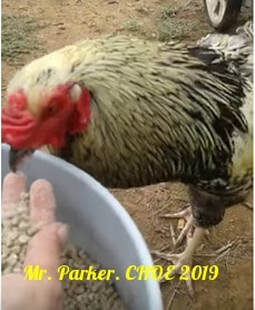
Your adult chickens need a complete and balanced chicken feed combined with dirt or grit to grind their food in order to maintain good health. There are some variations to free range and non free range feeding. The following is a list of guidelines to follow to keep your chickens healthy and happy. It is important to keep food and scratch out for your chickens at all times during the day and make sure they have a fresh clean water supply. If your chicken does not have access to fresh dirt you may need to add oyster shells (grit) to their diet. If your chickens are not allowed to free range you can include fruits and vegetables to their diet. Chickens love to eat table scraps but you need to monitor how much table scraps they are eating. If their feces are loose or runny they are probably getting to many snacks, fruits, or veggies.
Basic feeding requirements for adult birds are:
Complete and balanced crumble. pellet feed, or wet feed. Studies show feeding chickens wet feed in a porridge like consistency results in faster weight gain. See below.
Grit
See information about organic feed below
Helpful Tip:
Give your chicken feed an added boost to aid your birds immune system and protect them from necrotic enteritis by sprinkling oregano on top of their feed at least once a week.
Forage and Greens:
Treats:
Chickens love treats and people love to give them to them. It is okay for your birds to have an occasional treat but for the most part they need to stay on their regular feed in order to get the correct amount of vitamins, minerals, and nutrients which they need to maintain good health.
Scratch grains-Only give scratch occasionally. If you give it to your birds every day many of the birds will eat only scratch which will result in vitamin deficiencies and health problems.
Meal worms-High in protein
Whole corn or cracked can be used as a treat and can be added to chicken feed to help your birds keep warmer during the winter months as they generate body heat when their body processes it. Whole corn contains more vitamins than cracked corn but should not be used as the main feed for chickens.
Chickens love treats but treats should not be given until after they have had their normal feeding. Too many treats and not enough nutritionally balanced feed can cause vitamin deficiencies and loose stools.
Baby chicks have different nutritional requirements. See what to feed baby chicks in the link below
See more below.
Basic feeding requirements for adult birds are:
Complete and balanced crumble. pellet feed, or wet feed. Studies show feeding chickens wet feed in a porridge like consistency results in faster weight gain. See below.
Grit
See information about organic feed below
Helpful Tip:
Give your chicken feed an added boost to aid your birds immune system and protect them from necrotic enteritis by sprinkling oregano on top of their feed at least once a week.
Forage and Greens:
- Forage-Green leaf material that chickens find when allowed to free range.
- Insects and more-Chickens will find and eat insects, frogs, baby snakes, etc. while foraging which helps them to meet their protein needs.
- Fodder-You can grow fodder for your chickens to supplement their feed and reduce your feed bill.
- Wheatgrass-Chickens love to eat wheatgrass and it is a great addition to their diet that helps reduce your feed bill.
Treats:
Chickens love treats and people love to give them to them. It is okay for your birds to have an occasional treat but for the most part they need to stay on their regular feed in order to get the correct amount of vitamins, minerals, and nutrients which they need to maintain good health.
Scratch grains-Only give scratch occasionally. If you give it to your birds every day many of the birds will eat only scratch which will result in vitamin deficiencies and health problems.
Meal worms-High in protein
Whole corn or cracked can be used as a treat and can be added to chicken feed to help your birds keep warmer during the winter months as they generate body heat when their body processes it. Whole corn contains more vitamins than cracked corn but should not be used as the main feed for chickens.
Chickens love treats but treats should not be given until after they have had their normal feeding. Too many treats and not enough nutritionally balanced feed can cause vitamin deficiencies and loose stools.
Baby chicks have different nutritional requirements. See what to feed baby chicks in the link below
See more below.
More About Feeding Chickens |
References:
Forbes, John. (2003). Wet Foods for Poultry. Avian and Poultry Biology Reviews. 14. 175-193. 10.3184/147020603783637481.
Free stock photo of animal, chicken, cockerel. (2018). Pexels.com. Retrieved 12 September 2018, from https://www.pexels.com/photo/animal-chicken-cockerel-countryside-375510/
Forbes, John. (2003). Wet Foods for Poultry. Avian and Poultry Biology Reviews. 14. 175-193. 10.3184/147020603783637481.
Free stock photo of animal, chicken, cockerel. (2018). Pexels.com. Retrieved 12 September 2018, from https://www.pexels.com/photo/animal-chicken-cockerel-countryside-375510/

